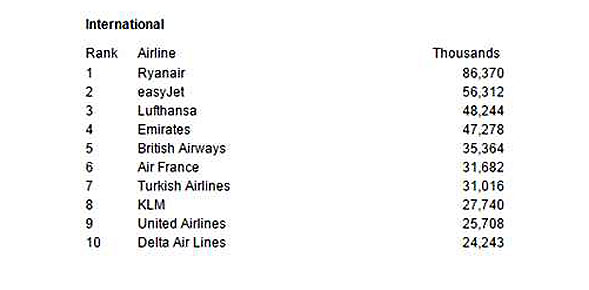A growth story across Europe as improving economic and travel backdrop rejuvenates trading. Top RevPAR growth stories in 2014 are Dublin, London and Paris. London, Paris and Edinburgh will see the highest occupancies in 2014
According to PwC’s latest European hotel forecast, the improving economic and travel backdrop has helped rejuvenate trading in almost all the 18 cities analysed. But the pace of growth varies from city to city and the challenge for hotels will be to capitalise on this improving climate while responding to the megatrends impacting their business.
PwC anticipate growth in 17 of the 18 cities in both 2014 and 2015. Madrid is the exception and is the only city seeing no growth in either 2014 or 2015. Encouragingly however, the rate of decline in the Spanish capital is slowing.
The top RevPAR growth stories, in local currency, in 2014 are Dublin (5.2%), followed by London (3.8%) and Paris (3.8%), then Edinburgh (3.4%), Berlin (3.2%), Frankfurt (2.9%), Vienna (2.7%) and Moscow (2.6%).
In 2015, in local currency, London (5.2%) is forecasted to top the growth league, followed by Dublin (3.8%), Lisbon (3.4%), Prague (3.2%), Moscow (2.8%), Edinburgh (2.8%), Zurich (2.7%) and Frankfurt (2.6%).
 Commenting on what’s driving growth, Robert Milburn, head of hotels at PwC, said: “Travel prospects in Europe are brighter, with consumers prioritising their main holiday above a wide range of other goods and services. Business travel is expected to influence hotel trading in Germany, UK and France. Instability in North Africa could also drive more tourism to southern European destinations.”
Commenting on what’s driving growth, Robert Milburn, head of hotels at PwC, said: “Travel prospects in Europe are brighter, with consumers prioritising their main holiday above a wide range of other goods and services. Business travel is expected to influence hotel trading in Germany, UK and France. Instability in North Africa could also drive more tourism to southern European destinations.”
Liz Hall, head of hospitality and leisure research at PwC, added: “It’s a mix of ADR and occupancy, although in many cities ADR is the stronger metric. This is true in cities like London where despite a high supply pipeline, occupancy is already very high and the city is virtually full up mid-week. By contrast, it’s largely occupancy driving growth in Lisbon and Milan.
“Supply will cast a shadow in some cities; high levels of new supply could drag down performance in off-peak times. Moscow, Amsterdam, London, Berlin, Edinburgh, Zurich and Vienna have some significant pipelines, some above the long term average.”
Who tops the European occupancy league table?
In 2014, London, Paris and Edinburgh will see the highest occupancies up in the 80s, with Dublin not far behind. In 2015, most cities will see further growth with the league table topped, albeit by a whisker, by Edinburgh (83%), with London runner-up (82.9%) and Paris and Dublin following. However, round up London’s occupancy and it shares the top spot with Edinburgh.
Which cities are the most expensive?
The Swiss cities continue to be in a league of their own. The most expensive city is Geneva (230.50 euros), followed by Zurich (196.40 euros), then London (163.80 euros) and Paris (155.20 euros).
Most cities will see further ADR growth in 2015 but Geneva is expected to drop to 227.60 euros. It will still lead the rankings though.
And the highest RevPAR goes to…
In 2014 the high ADR and occupancy rates translate into lofty RevPAR levels. Geneva tops the table (at 152.30 euros), with Zurich (142.70 euros), London (135.50 euros) and Paris (126.90 euros) staying ahead of the others.
In 2015, there will be more growth in yields including Zurich, London and Paris as fundamentals remain healthy.
Supply – what’s actually being built?
There are over 61,000 rooms estimated under construction in Europe according to STR Global. With demand currently outstripping supply in Europe, these levels are not considered an issue, although at a local market level this could be a different story. Russia, UK, Turkey and Germany have sizeable pipelines and account for around 60% of the 61,000 rooms.
Some of the largest increases as a proportion of existing supply can be seen in Moscow, Istanbul, London, Amsterdam, Berlin, Edinburgh, Zurich, Frankfurt and Vienna. Currently Dublin has no new rooms in the pipeline.
Liz Hall added: “Upscale segments comprise over half of the total under construction with midscale rooms accounting for around a quarter and economy and luxury, around 13% and 8% respectively.”
High hopes for London – further records are expected to be broken in 2015
In London, 2013’s strong finish should continue this year. PwC anticipates 2014 will see records broken as 3.8% RevPAR growth takes RevPAR to £117.10, an all-time high. This will be driven almost entirely by ADR growth of 3.4% as rates climb to £141.60 in 2014.
In 2015 we expect things to get even better as hoteliers capitalise on the good times. A 5% jump in rates takes ADR to £148.70 and RevPAR growth of 5.2% takes RevPAR to £123.20, again higher than anything seen before (in nominal terms). London will see high occupancies averaging almost 83% – the highest since the mid 1990’s.
Commenting on what London can expect in 2014 and 2015, Liz Hall, head of hospitality and leisure research at PwC, said:
“Occupancy is expected to stay high and rates to see more growth. There will be stimulus to business and leisure prospects as GDP recovery strengthens. There are plenty of events to draw in visitors, including the Farnborough International Airshow in July, and a relaxation of Chinese visa rules will also be positive.
“London soaks up the new supply but off-peak it could be challenging, the high proportion of budget supply could prove challenging. In 2015 hoteliers should have more confidence to increase rates, especially if 2014 turns out as expected with a stronger swing to a ‘seller’s’ market.”
How have the UK regions performed and is the outlook bright?
In the regions, PwC anticipate 2013’s healthy growth will be sustained in 2014, albeit at a slower pace with RevPAR growth of 3% taking RevPAR to £44.60, the highest since 2007 in nominal terms. Occupancy is expected to keep nudging up, by 0.9% and 0.3% respectively each year, as occupancies top 73%, the highest levels recorded. ADR could see further growth of 2% this year, lifting rates over £60, the highest since 2008.
In 2015, ADR growth of 4% is well above the long-term average, and takes rates to £63.20 and restores the regions’ fortunes somewhat. RevPAR growth of 4.3% in 2015 takes RevPAR to £46.50.
Commenting on what the regions can expect in 2014 and 2015, Liz Hall said: “Demand outside London is tied closely to UK economic growth, so the UK’s accolade as the fastest growing large European economy in 2014 is very positive. Meetings and conferences continue to show some improvement, rates and demand are increasing for some venues but corporates are still seeking savings. 2015 is expected to see more operator confidence and progress on ADR.
“New products will make for an even more competitive environment and challenge older hotels. Although the economic prospects are improving and inflation rates are relatively subdued, hotels will have to be watchful of changes in the cost of doing business. After years of pay freezes or restraint, employees are pushing for higher salaries and politicians are considering significant increases in the minimum wage.”
All in all, it is a growth story across Europe and the UK, but some issues are likely to impact hotelier’s profitability.
Robert Milburn concluded: “The global economic landscape is changing quickly and hotels have to constantly adapt to these changes to remain successful in the market. The cost of doing business, regulations and taxes, competitive accommodation products and keeping hold of customers are just a few of the issues that the sector is grappling with.
“Hotels need to be nimble and understand the issues and their implications for their businesses. Some trends, like the mobile and digital revolution, are taking hotels to a whole new world as they battle to stay relevant to consumers. The challenge for hotels is to capitalise on the improved environment as well as the new opportunities a changing world offers.”
Photo caption: Hotel Schweizerhof Bern.
Vicky is the co-founder of TravelDailyNews Media Network where she is the Editor-in Chief. She is also responsible for the daily operation and the financial policy. She holds a Bachelor's degree in Tourism Business Administration from the Technical University of Athens and a Master in Business Administration (MBA) from the University of Wales.
She has many years of both academic and industrial experience within the travel industry. She has written/edited numerous articles in various tourism magazines.




















































































































































































